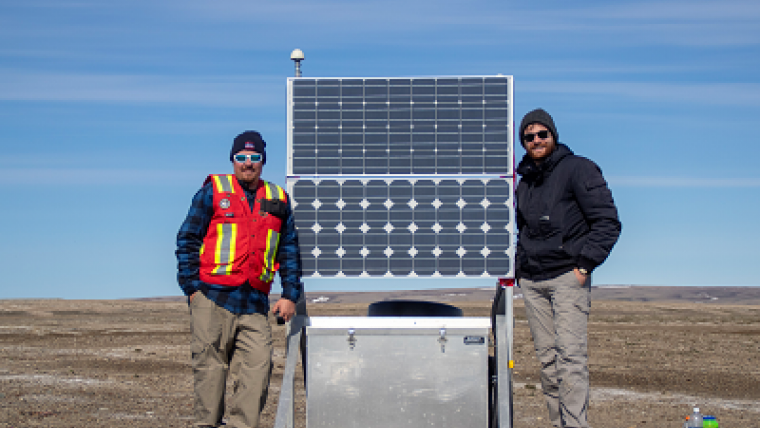New report: Adapting to climate change
Leading experts from across Canada call for urgent action to address climate change and its impacts on our communities, environment and economy
June / July 2021
The question is no longer if climate change is happening but what we can do about it. According to the Canada in a Changing Climate: National Issues Report, a sweeping new document that outlines how climate change is affecting Canada, it has now become a matter not only of reducing our greenhouse gas emissions but also of adapting to the new normal.

More extreme weather conditions like drought could lead to stressed forests, which could then lead to wildfires and pest outbreaks.
(Source: Istock)
Canada has always been a country of climate extremes, and greenhouse gas emissions are increasing the intensity of these extremes and accelerating the pace of change. In fact, on average, Canada is warming at double the global rate, with the northern parts of the country experiencing the greatest change. We’re experiencing more extreme heat, less extreme cold, longer growing seasons, shorter seasons of snow and ice cover, earlier springs, shrinking glaciers, thawing permafrost and rising sea levels. And these changes are affecting our communities, our environment and our economies.
More action needed
The report brings together the latest science and knowledge, including Indigenous knowledge. “There is work being done on adaptation so Canadians can be more resilient to climate change and take advantage of opportunities,” says Catherine Lafleur, the co-author of one of the eight chapters in the report. “Still, most of this work is at the knowledge and planning stages. More action is urgently needed. At a basic level, there are two critically important ways we can take action: mitigation (reducing greenhouse gas emissions) and adaptation. This is not an either-or choice. Both approaches can proceed together.”
Lafleur has graduate degrees in forestry and chemistry and 11 years experience with the Canadian Forest Service. Now with Natural Resources Canada’s (NRCan) Climate Change Impacts and Adaptation Division, she co-authored the report’s chapter that examines climate change and how Canada’s economic sectors area are adapting to it. She brought together research from several NRCan experts: Yan Boulanger and Marc-André Parisien on fire risk modelling, Amy Christianson on wildfire evacuation data and Nirmal Subedi on the direct and indirect costs of wildfires.
One chapter of the National Issues Report looks specifically at how different sectors in Canada are adapting to climate change.
Everything is connected
In some sectors, such as forestry, agriculture and fisheries, climate change can have direct impacts on production and operations due to extreme events like floods, drought and heat waves. And all sectors will experience indirect effects like disruptions in infrastructure and supply chains, making it challenging to get supplies and workers to job sites and to get products to markets. There is also a domino effect associated with climate change that is particularly hard on our natural resources. For example, climate change can directly lead to drought, making forests more susceptible to pest infestations and wildfires, which in turn may lead to community evacuations, health issues and business shutdowns. Post-fire landscapes can lead to changes in ground stability and water quality, which then affects wildlife, public health and infrastructure planning. It’s a complex dynamic.
How do we adapt?
Most of us are familiar with ways to reduce our carbon footprint, but how can we adapt to climate change? The key is being prepared, proactive and adaptive. Many communities and economic sectors are already starting to adapt. If you’re in the North and permafrost thaw has buckled the only road into your community, it may need to be relocated and more research put into making sure that transportation infrastructure — our roads and bridges — is built on solid ground. If you’re in Nova Scotia or New Brunswick, longer and warmer growing seasons may mean the forest sector needs to look at the cultivation of alternative hardwood trees as species ranges shift north. Across the country, the tourism sector is feeling the pressure from global warming. This is especially true for winter recreation businesses that may need to invest in more snowmaking equipment or consider alternative approaches to attract customers to use their services in different ways.
Making a difference
“We all have a role to play,” says Lafleur who recently obtained her Climate Change Professional credential, certified by the Association of Climate Change Officers. We can lower our carbon footprint, and governments, businesses and communities can take action to adapt to climate change on a broader scale. “People are listening, people are primed for change,” she adds. “This is something we can work on together — in fact it’s better together — in an integrated holistic way.”
The National Issues Report is part of Canada in a Changing Climate: Advancing our Knowledge for Action, the national assessment of how and why Canada’s climate is changing; the impacts of these changes on our communities, environment, and economy; and how we are adapting. This report builds on the science foundation provided by Canada’s Changing Climate Report, released in 2019. NRCan leads Canada in a Changing Climate, a process that depends on the collaboration of a broad partnership of subject-matter experts and assessment users from all orders of government, Indigenous organizations, universities, professional and non-governmental groups, and the private sector.
For more information:
Simply Science: Canada’s Changing Climate Report
Simply Science: Permafrost thaw brings major problems to Canada’s Northern Arctic
Page details
- Date modified:


